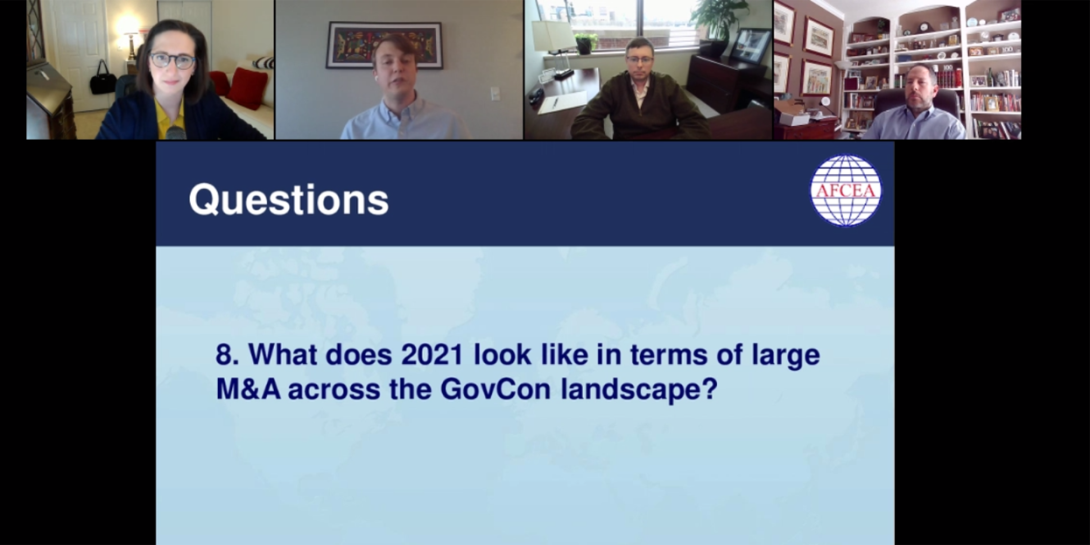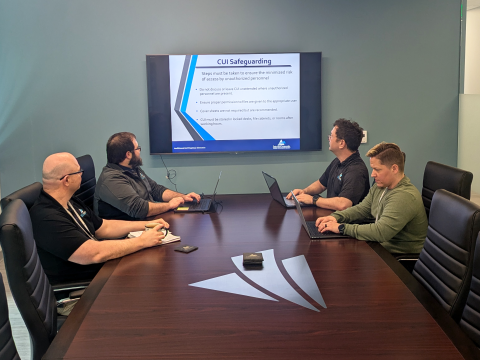Sellers, Be Aware
Residential real estate isn’t the only hot market these days. While the pandemic has negatively affected hundreds of industry sectors, it has had little to no effect on mergers and acquisitions in the government contractor arena.
Experts in the fields of business strategy, transaction due diligence, finances and investments discussed the mergers and acquisitions (M&A) topic during a member-only AFCEA webinar presented in an “ask the expert” format. Lisa Shea Mundt, co-founder of The Pulse of GovCon, moderated the discussion about topics based on questions collected from registrants prior to the event.
One piece of advice many small businesses were interested in getting their hands on was how to set realistic expectations regarding their company’s value when they are considering selling it. Mundt said she’s seen owners with some “wildly outlandish" expectations of their company’s worth.
“So Josh, how do you set realistic expectations?” Mundt asked panelist Josh Heacock. “Not to call out our firm, but this is really where an outside adviser, I think, plays an important role,” he said. Heacock is the director of CSP Associates and serves as the lead defense and government services analyst.
“An outside adviser brings obviously a wealth of market knowledge and is seeing volumes of deals, but also has an unbiased structure that really helps kind of allow the control. … So, we use facts on the ground to speak for themselves.” Keep in mind, Heacock added, sellers will only receive what buyers are willing to pay.
Determining when it’s time to sell your small business is oftentimes a challenge, especially when the market is as hot as it currently is, Mundt pointed out. “How do you know when you're even ready to sell?” she asked the panelists. “How do any of us know, really? Is it a gut feeling? Is there more than that?”
For small businesses, Kristjan Kornmayer has seen two types of business founders interested in selling: those who want to change their lifestyles and those who want to grow their businesses as part of their success strategy. “Obviously, the calculus for when to sell varies greatly depending on seller motivations,” said Kornmayer, who is the senior director at the Chertoff Group LLC and leads the Merchant Bank’s M&A advisory practice.
External factors also influence decisions about selling, he related. For example, changes in the political and tax environments can be powerful motivators for sellers. Also, the “frothy valuations” these days and the amount of activity can accelerate decision making or “amplify the desire to sell,” he asserted.
Under today’s pandemic circumstances, webinar attendees also were interested in what the experts had to say about how remote working as new norm could affect due diligence and negotiations in the M&A realm.
Bob Kipps, founder of investment banking firm KippsDeSanto & Co., pointed out that even before the pandemic began, much of the M&A groundwork was often done remotely. “It isn’t drastically different than what it was pre-COVID. People were accustomed to looking at spreadsheets and other information online beforehand, and a lot of negotiations were and are done by [phone] calls,” Kipps said.
Another aspect of deal-making also hasn’t changed much: closing in on finalizing a deal, he added. While a company’s large teams are more likely to meet on Zoom than in a conference room, once the foundation is solid, leaders of companies will most likely meet in-person over a socially distanced lunch or walk in the park. “There is still an element of comfort that comes along with meeting in person as there’s always been,” Kipps opined.
But Heacock pointed out one way the increase of teleworking has affected companies: It has enabled companies to do more business. Cutting back on travel time—both to and from the office and to and from cities—has boosted overall personnel productivity. Consequently, firms like his have been able to spend more time with their clients, adding to the quality of due diligence, he related.
Other topics covered during the webinar included how owners can determine when or if they are ready to sell and what types of companies are currently most appealing to buyers. The webinar will be available for AFCEA members on demand on the association’s website.



Comments